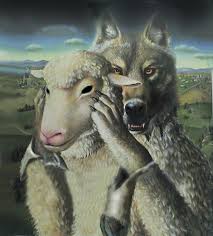
When most of us think of narcissists, we think of the overt type– arrogant and full of themselves, outwardly aggressive, flying into rages if they don’t get their way or their supply is not cooperating, confrontational, demanding, and high-maintenance. Think of the tyrannical boss everyone’s terrified of; the demanding, high maintenance, conceited friend; the roommate who feels entitled to “borrow” your clothes, car or money without asking; or the abusive and philandering husband–those are examples of overt narcissists. They’re in your face. They’re outwardly obnoxious. They may seem nice when you meet them (otherwise they wouldn’t be able to trap you as prey), but as soon as you’re in their clutches, they begin to show their true colors.
The second type, covert narcissists, seem much more benign, even after they’ve reeled you in as a source of supply. They don’t necessarily drop the nice act. That’s why they’re so dangerous. Because it’s hard to put your finger on what these dolls are actually doing, you may think there’s something wrong with you for feeling wary or nervous around such a “nice” person. They are the true wolves in sheeps clothing. The red flags are much harder to see in a covert narcissist. But make no mistake–they are predators too.
Some examples of covert narcissists include:
— the compassionate and friendly nurse who “accidentally” kills her patients.
— the needy friend who gives you unasked for gifts or does unasked for favors, then complains that you are acting selfishly if you want to spend time doing something besides being with them.
— the spouse who plays “martyr” and puts everyone on a guilt trip because of “everything they’ve done for you.”
— the friend who seems to have a neverending litany of problems, but when you try to help them they never take your advice or give you a long list of reasons why the advice you give them will never work. This friend is an emotional parasite, and will make you feel drained.
— the parasitic spouse who won’t get a job (and doesn’t appear to be trying). They keep giving you “reasonable” excuses as to why they can’t find one or why they haven’t tried to look. Really, they are just trying to live off you.

Illustration by Mike Reed.
The red flags we normally look for to peg a narc are much more difficult to detect in a covert narcissist, because they can seem so friendly, charming, generous and even altruistic (yes, altruism can be selfish when it comes with strings attached). The website Info Self Development, in their article about covert vs overt narcissists, lists these tell tale signs for recognizing a covert narcissist:
–Emptiness, seems to have something missing that you can’t quite put your finger on
–Stubborn, rarely apologising unless they want something from you (see narcissistic supply)
–Ability to make you feel guilty, even when something is not your fault
–Entirely self centered; they are the center of their own universe
–Expert liars; charming, hypnotic, a master of manipulation
–Projecting their insecurities and defects onto you
–Very sensitive to constructive criticism
–Inability to form intimate relationships
–Inability to feel genuine remorse
–Blaming others for their problems
–Low emotional intelligence
–Highly materialistic
–Extreme lack of empathy
–Superficially charming
–A victim mentality.
I think the last one is important– victim mentality. These are the do-gooders, the “altruists,” the first person to volunteer for the church fundraising drive, the mother who volunteers as the classroom mother, the favor-doing friend. If you fail to “appreciate” their good deeds to their satisfaction or live up to their unrealistically high expectations (for example not volunteering ALL your free time to the church fundraising drive), watch out. That’s when they will work behind the scenes to ruin your reputation through gossip, lies, and triangulation. They are “martyrs” and you are selfish and evil for not sacrificing yourself the way they have “for you.”

They can also appear in the form of a needy “friend” who monopolizes your time with a seemingly neverending litany of problems or crises (sometimes brought on by themselves). They never seem to learn from their mistakes, and they will eat up your time and patience pleading or begging you to “fix” things for them. They almost seem to take a perverse pride in being victims. But any advice you give them will be dismissed or ignored. They will make excuses as to why the advice you gave them wouldn’t work. In some cases you may even be blamed for giving them the “wrong” advice, thereby making their problems even worse. They are emotional vampires who take and take, but never give anything back in return. If you ever have a problem, fuggaddaboutit. They won’t be there for you.
Covert narcissists may seem nice, but they aren’t. As with any narcissist, the best way to handle them is by avoiding them or cutting off contact with them if you can.





